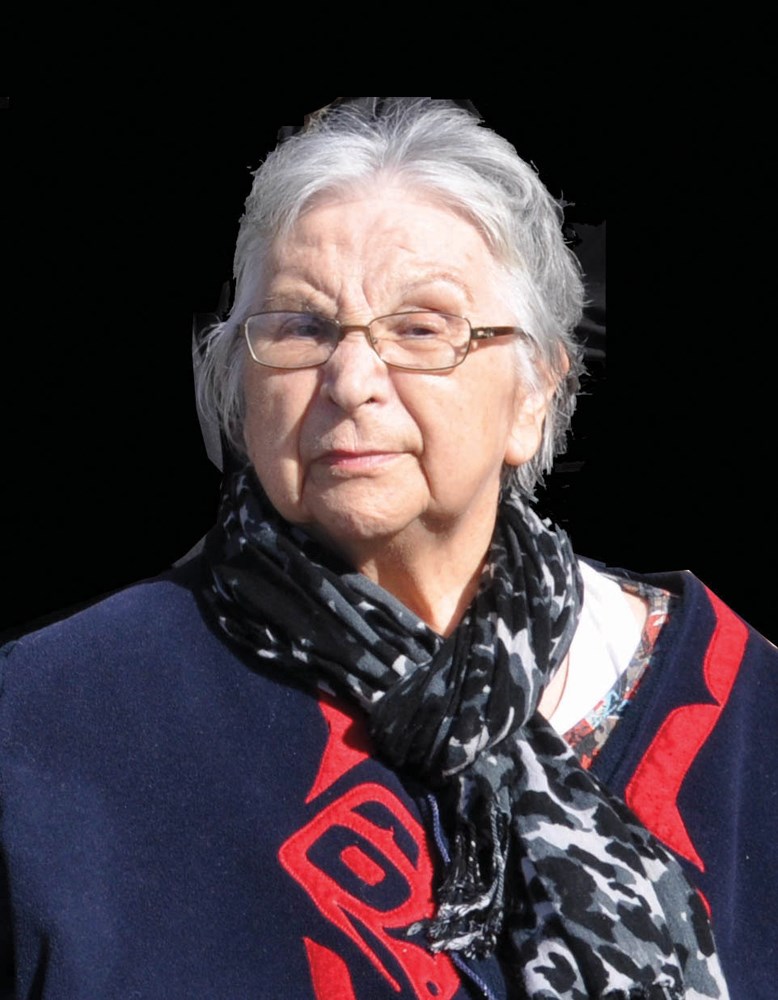It was almost three years ago when shíshálh Nation elder Anne Quinn was profiled in our 2016 International Women’s Day feature. During her interview with reporter Christina Symons, Anne, who was then 81, said something that must have struck a few readers as a foreign concept. She was talking about her passion for an ongoing project – documenting the family history of her nation.
“The family tree will bring out so much knowledge, as it’s important to first know who you are,” she said. “If all families were interested in the family tree, we could lift everyone up.”
It was a profound insight about what makes humans tick – that knowing and caring about one’s ancestry and kinship ties can “uplift” a person, a family and a people.
It was a lesson from a master life teacher.
Anne Quinn (sempatkwa, sonee), who passed away Jan. 14 at Totem Lodge in Sechelt, was mourned and celebrated Saturday at shíshálh Nation Community Hall. She was given a first-class send-off and drew a packed house.
In a 20-minute eulogy filled with rich detail and flashes of humour, niece Candace Campo (xets’e-mitsa) described Anne’s traditional shíshálh upbringing in the village of tsunay on Deserted Bay. It was during the Great Depression, and Abraham Jeffries, Anne’s grandfather, impressed on her the value of education. She always worked hard. Even as a child attending residential school in Sechelt, “she went to the other side and cleaned houses.”
She earned her high school diploma in Kamloops, met her partner Lawrence Quinn in Vancouver and had seven children. She held many jobs to support her family – cannery worker, social worker, janitor, education coordinator, band councillor in the crucial years leading up to self-government, researcher, and was the nation’s first archivist. Being a fluent shashishalhem speaker, Anne made important contributions to the groundbreaking Sechelt Dictionary and was remembered last week by Chief Warren Paull as “a pioneer in our language program and within our community.” Ron Beaumont, who compiled the dictionary and is almost exactly Anne’s age, also spoke at Saturday’s celebration of life.
Candace recalled that Anne “always sang to us” and loved to dance and to travel. Once, she took Candace on an Alaska cruise and “laughed at me for a whole week when I got hypnotized on stage.”
She was “Sechelt Nation’s Angus Reid,” Candace said, and could predict the outcome of an election “down to the tee.”
A devoted friend, Anne maintained a pen pal in the U.K. for more than 50 years.
“Mostly Auntie Anne was a very proud grandmother,” Candace said. “She was always a lady” and “she was Lady Luck.”
Anne and her sister, the late Theresa Jeffries, in their later years “were very busy people but they always took the time to crotchet and knit blankets for all the babies that were born. They did it for as long as they could, until they couldn’t see their needles anymore.”
On behalf of the nieces and nephews, Candace expressed “our immense love and gratitude for Auntie Anne, for all that she gave us and all that she taught us. With Auntie Anne there was always space for one more – or one more family.”
She also echoed her beloved aunt’s insight from 2016, describing Anne’s work collecting the nation’s genealogy as one of her “phenomenal” accomplishments.
“This initial foundation has really put our nation in a strong place,” Candace said.
It was clear Saturday that there are plenty of good and capable people ready to carry on the work. But there won’t be another one like Anne Quinn – not in this lifetime.



